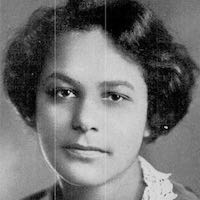Joy shakes me like the wind that lifts a sail,
Like the roistering wind
That laughs through stalwart pines.
It floods me like the sun
On rain-drenched trees
That flash with silver and green,
I abandon myself to joy—
I laugh—I sing.
Too long have I walked a desolate way,
Too long stumbled down a maze
Bewildered.
Published:
1926
Length:
Shorty
Literary Movements:
Harlem Renaissance
Anthology Years:
2022
Themes:
Joy & Praise
Nature
Literary Devices:
Anaphora
a figure of speech in which words repeat at the beginning of successive clauses, phrases, or sentences
Simile
a comparison between two unlike things using the words “like” or “as”
Transferred Epithet
When an adjective usually used to describe one thing is transferred to another.
Varied syntax
diverse sentence structure

